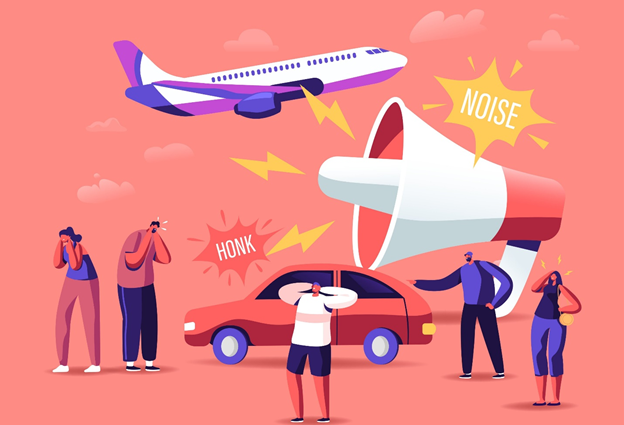Loud and constant noise is more than just annoying. It can be a severe health hazard. This noise pollution is becoming increasingly common in our cities and towns as we move further away from rural living. Noise pollution is a real health risk that leads to many physical and mental health issues, not just an annoyance or a ringing in the ears. And most people don’t know how much danger they are in or how to protect themselves.
In this article, I will highlight how noise pollution has become an increasingly prominent health risk factor and discuss its causes and health effects. With this knowledge, you’ll be better prepared to protect yourself from the dangers of noise pollution.
What Is Noise Pollution?
Noise pollution is an increased ambient noise in our environment that can have adverse physical and psychological effects on humans and animals. It is caused by man-made and natural sources, including construction noise, traffic, industrial machinery, and natural sources such as wind and storms. Noise pollution has been linked to various health risks such as hearing loss, cardiovascular disease, sleep disturbances, anxiety and depression, learning difficulties in children due to distraction in class, and stress levels caused by a lack of concentration or inability to relax during leisure hours. In the long run, these effects can lead to severe illnesses like heart problems or mental disturbances.
Causes of Noise Pollution
Noise pollution is caused by many sources, from transportation to industrial activities and even natural sources. One of the most contributing factors to noise pollution is traffic; it’s estimated that motor vehicles account for over 50% of all noise pollution in urban areas. Other artificial sources include construction activity, aircraft, railways, factory machinery, and amplified music from bars or nightclubs. In addition, natural phenomena such as thunderstorms or earthquakes can also generate loud noises.
Noise pollution has also been linked to an increase in air pollution levels. As air pollutants are emitted from vehicles and other sources, they create vibrations within the atmosphere that contribute to higher levels of noise pollution. On top of this, aircraft operations and fireworks display can also cause increased levels of noise pollution. Climate change has also been shown to worsen the effects of noise pollution due to rising temperatures or changing weather patterns. Higher temperatures can lead to higher levels of ground-level ozone, directly affecting sound waves over large distances and leading to more noise pollution in our everyday lives. To avoid noise pollution, many people use sound absorbing panel in Singapore.
Health Effects of Noise Pollution
When it comes to noise pollution, it’s not all in your head; it can also have significant and lasting effects on your health. The World Health Organization has indicated that “30 percent of people living in cities are regularly exposed to noise pollution deemed unhealthy for humans”. It is seen that excessive noise can cause elevated stress levels and anxiety, which can lead to a variety of medical issues, including elevated blood pressure, heart disease, and stroke. Long-term exposure to noise pollution can also cause sleep disturbances, depression, and hearing loss. Noise pollution can cause physical illnesses such as headaches, fatigue, and dizziness. Evidence suggests that it may also increase your risk of developing diabetes due to disrupted insulin production and an increased risk of developing cardiovascular diseases due to prolonged periods of stress.
Conclusion
Taking action on noise pollution is important to protect our health and is essential to preserving our soundscapes as a source of peace, joy, and refuge. It’s up to us to create the necessary changes to protect our health from the dangers of noise pollution, and it’s up to us to advocate for better laws and regulations. We can ensure everyone enjoys a healthy, peaceful, sound environment with collective action. That’s why you must take the right action today so you don’t have to face these undesirable consequences tomorrow.

